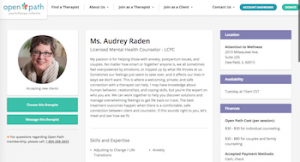If you don’t have a “Cadillac” insurance plan, costs for talk therapy can give you sticker shock. Maybe you have a high deductible, or maybe your therapist is out of network. Maybe you are only allotted a low number of visits per calendar year, or have a high co-insurance. Or maybe you don’t even have insurance. Additionally, insurance only covers what they consider “medically necessary,” so some diagnoses or interventions are not covered by some or all plans. For example, if your marriage is rocky, couples counseling tends to not be covered by insurance.
If you can afford to pay the full cost of therapy, this isn’t a problem for you. On the other hand, if you’re living paycheck to paycheck, you may decide to forgo the help you need because you feel like counseling is something you simply can’t afford. But untreated mental health issues can affect our physical well-being and “are associated with the prevalence, progression, and outcome of some of today’s most pressing chronic diseases, including diabetes, heart disease, and cancer.”1 And letting it slide without treatment can also affect your job, school, relationships, and family life. We think we can “suck it up” and push through, and sometimes we can. But sometimes, it festers and affects us in ways we don’t immediately realize. Sometimes, it ends up costing more than we realize to do nothing about our mental well-being.

Still, we’re left with the practical matter of how to make it affordable. First, and most importantly, is making the decision to make your mental health as important as your physical health. After all, if you had a broken arm, you’d make sure to seek help, right? Second, take a look at your budget to see what you can afford. Remember that a good therapist is looking to put themselves out of business, essentially. While there’s not likely to be a quick fix (any more than a broken arm would be quick), therapy isn’t typically about signing on for years and years. The healing of that arm might take a month or two of physical therapy. A course of cognitive behavioral therapy for panic disorder might take about three months. So this isn’t a forever thing.
There are a number of options out there for under- or un-insured people who want therapy. It can feel daunting to navigate these options when you aren’t feeling your best, so if it makes it easier, ask someone you trust to help you with this part. They can use their “Google-fu” or make information-gathering phone calls on your behalf.

- Community Mental Health Centers: use Google or https://findtreatment.samhsa.gov/ to search for one of these near you. They receive government funding to help the community by providing mental health services at reduced rates. They often treat a range of concerns, from the very severe to the more common.
- Websites like Open Path Collective are listings of therapists willing to offer steeply reduced sliding scales (often at the cost of what a co-pay would be) for under- or un-insured clients. You can see my profile here.
- Therapists in private practice often offer a sliding scale for those with financial hardship. This is often nearly 50% what their full fee is, and may be a rate you can afford.
- Some private practice therapists offer pro bono appointments. Many times, they will offer this service to people who are experiencing problems within their specialty. For example, I will take one pro bono (free) client at a time in my caseload who is experiencing pregnancy or postpartum mood or anxiety issues, because it is a cause I am particularly passionate about. It’s worth it to ask a private practice therapist about sliding scale or pro bono options.
- Groups: If you are comfortable with a small group, support groups can be a super affordable way to receive support and learn new ways to cope.
- The NAMI helpline, while not a crisis line, can help you find local resources or groups: 1-800-950-NAMI (6264) or info@nami.org.
- Check to see if your company has EAP benefits you can use. This could afford you some short-term, solution-focused therapy, and get you connected with a therapist.
- There are online therapy sources like BetterHelp that are more affordable than traditional therapy. It’s not face-to-face, but instead utilizes text and video chat.
- If you are experiencing a crisis, please call 1-800-273-TALK (8255) or text START to 741-741.
Please feel free to contact me at Attention To Wellness to discuss affordable therapy.
1 https://www.healthypeople.gov/2020/leading-health-indicators/2020-lhi-topics/Mental-Health
Audrey Raden, LCPC
Attention to Wellness
Ready to make an appointment? Call 847-370-0606


Add Comment